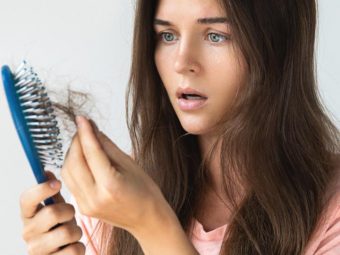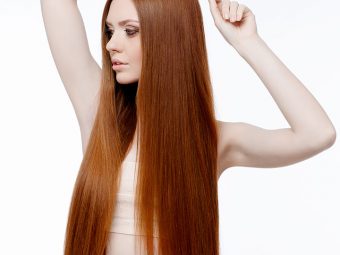Fish Oil For Hair Growth: Benefits, How To Use, And Precautions
Experience the antibacterial, anti-aging, and anti-inflammatory properties of this natural oil.

Usage of fish oil for hair growth is slowly gaining popularity. It is a rich source of omega 3 fatty acids. When applied regularly, it can soothe the scalp, reduce irritation, promote hair growth, and combat dandruff. Read on to learn more about fish oil, how it can benefit your hair, and how to use it correctly to reap the maximum benefits.
In This Article
Fish Oil – How Is It Extracted?
Fish oil is derived from the tissues of fatty fish like mackerel, anchovies, trout, salmon, etc. The oil has many therapeutic and cosmetic applications. It is extracted through various methods like the use of supercritical fluids, wet pressing, extraction using solvents, or fish silage employing enzymes (1). The most common extraction method is wet pressing, carried out in four stages – cooking, pressing, decantation, and centrifugation.
Fish oil has various benefits for hair. Let us explore them in the following section.
How Does Fish Oil Benefit Hair?
1. Stimulates Hair Growth
Mackerel is a fatty fish rich in nutrients. In a mice study, mackerel-derived fermented fish oil increased the proliferation of dermal papilla cells, thereby stimulating hair growth. The oil prolonged the anagen phase of the hair follicle growth and increased the hair shaft’s life period (2).
2. Improves Scalp Health
Fish oil has antibacterial properties (3). The oil may help keep the scalp clean and improve hair and scalp health. It helps protect skin against aging and dermatitis. It also may promote wound healing (4).
Importance Of Fish Oil In Hair Health
Fish oil contains omega-3 polyunsaturated fatty acids like DHA, which reduce atopic dermatitis and oxidative stress. This suggests that the oil might reduce hair loss caused by oxidative stress. Omega-3s can help reduce hair loss by increasing hair density and reducing the telogen phase of hair growth (5). Omega-3s being healthy fats also may prevent a flaky and dry scalp.
3. Reduces Hair Loss
Omega-3s were also found to inhibit 5-alpha reductase, which produces the hormone that causes hair loss. The fatty acids also have anti-inflammatory properties that help reduce hair loss and improve hair health in terms of hair strength and volume (6).
Other Important Facts About Fish Oil
Fish oil contains polyunsaturated fatty acids that promote thick hair (7). Marine protein supplements were found to improve the skin and hair of women with self-perceived thinning hair (8).
These are a few of the important benefits of fish oil. In the following section, we will look at how you can use it for hair growth.
How Do You Use Fish Oil For Hair Growth?
1. Include Fish In Your Diet
Fish is rich in omega-3 fatty acids that help improve hair health. The recommended fish include mackerel, herring, salmon, sardines, albacore tuna, and lake trout. Try adding fish oil to your recipes and smoothies. You may want to check if you are allergic to fish oil before adding it to your diet.
2. Take Fish Oil Supplements
You can also choose fish oil capsules or pills available on the market. A health professional can guide you properly about the correct dosage.
3. Use A Hair Mask With Fish Oil
Fish oil is not often used topically because of its strong odor. But anecdotal evidence suggests that applying a blend of olive oil and fish oil to your hair offers nourishment and moisturization. However, scientific studies are scarce in this aspect.
How Much Fish Oil Should You Take?
A dosage of 250–500 mg of omega-3 fatty acids per day should suffice (9). The dosage also depends on an individual’s needs. If you have any specific health condition, consult your doctor before taking a fish oil supplementation.
Precautions
Intake of fish oil and its supplements are generally considered safe. However, fish may also have the risk of mercury contamination (10). In this case, fish oil supplements from a reputed brand are preferable. Pregnant and lactating women may also benefit from fish oil supplements.
When on supplements, stick to the prescribed dosage. Overconsumption of fish oil, as per anecdotal evidence, may lead to headache, indigestion, nausea, rashes, bad breath, and diarrhea. If you have any medical conditions, please check with your doctor before adding fish oil to your diet.
Fish oil is a rich source of omega 3 fatty acids and can help promote hair growth, improve scalp health, reduce dandruff, and minimize irritation. The antibacterial and anti-inflammatory properties of fish oil offer several benefits to the hair. You may use fish oil for hair growth in the form of fish oil supplements or hair masks. Including fish in your diet is also a good way to improve hair health. Follow the tips mentioned to use fish oil correctly and consult a doctor before taking any supplements.
Frequently Asked Questions
Can I put fish oil directly on my hair?
Yes, you can apply fish oil directly to your hair. But it has a strong, unpleasant odor.
Is fish oil good for thinning hair?
Fish oil contains omega-3 fatty acids, and consuming it may increase hair density (5). It stimulates hair growth, reduces hair loss, and improves your scalp and hair health.
Can I take biotin and fish oil together?
Yes. You can take biotin and fish oil together. However, consult your doctor before taking these supplements as they may cause nausea and other side effects.
Key Takeaways
- Fish oil is extracted in four stages – cooking, pressing, decantation, and centrifugation.
- Fish oil promotes wound healing, improves hair, and keeps the scalp clean.
- You can take fish oil supplements after consulting a health professional.
- Pregnant and lactating women can also have these supplements.
Sources
- Methods of extraction refining and concentration of fish oil as a source of omega-3 fatty acids
http://www.scielo.org.co/scielo.php?script=sci_arttext&pid=S0122-87062018000300645 - Mackerel-derived fermented fish oil promotes hair growth by anagen-stimulating pathways.
https://www.ncbi.nlm.nih.gov/pmc/articles/PMC6164340/ - Antioxidant and antibacterial activities of omega-3 rich oils/curcumin nanoemulsions loaded in chitosan and alginate-based microbeads.
https://pubmed.ncbi.nlm.nih.gov/31404604/ - Cosmetic and Therapeutic Applications of Fish Oil’s Fatty Acids on the Skin
https://www.ncbi.nlm.nih.gov/pmc/articles/PMC6117694/ - Effect of a nutritional supplement on hair loss in women
https://pubmed.ncbi.nlm.nih.gov/25573272/ - Efficacy of a Nutritional Supplement, Standardized in Fatty Acids and Phytosterols, on Hair Loss and Hair Health in both Women and Men
https://www.hilarispublisher.com/open-access/efficacy-of-a-nutritional-supplement-standardized-in-fatty-acids-and-phytosterols-on-hair-loss-and-hair-health-in-both-women-and-m-2471-9323-1000121.pdf - Diet and hair loss: effects of nutrient deficiency and supplement use.
https://www.ncbi.nlm.nih.gov/pmc/articles/PMC5315033/ - Complementary and alternative treatments for alopecia: a comprehensive review.
https://www.karger.com/Article/FullText/492035 - Scientific Opinion on the Tolerable Upper Intake Level of eicosapentaenoic acid (EPA), docosahexaenoic acid (DHA) and docosapentaenoic acid (DPA)
https://efsa.onlinelibrary.wiley.com/doi/pdf/10.2903/j.efsa.2012.2815













